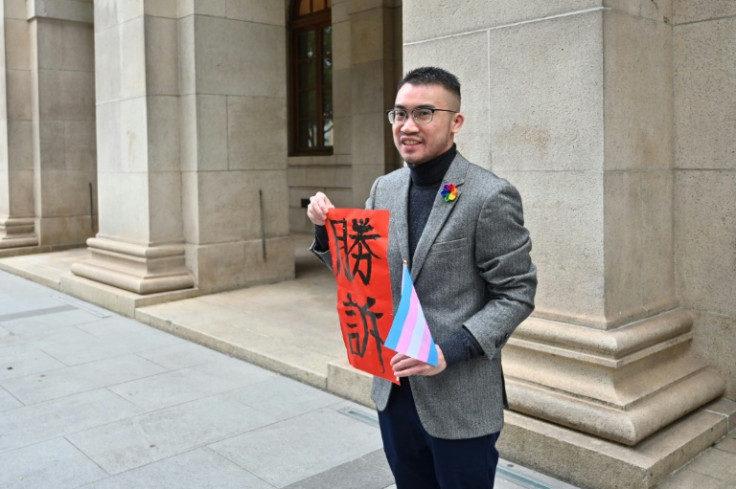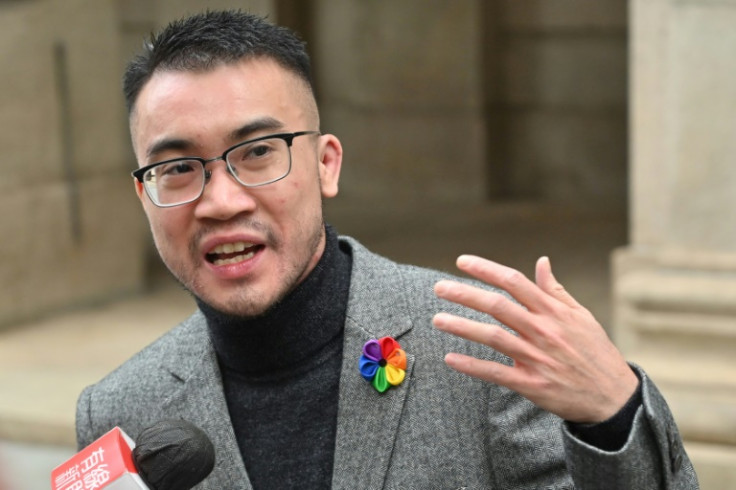Dreams Of 'Normal Life' Fuel Hong Kong Trans Activist's Fight

Identified as "female" on his Hong Kong ID, trans activist Henry Tse waged an arduous legal battle to have his real gender recognised.
Six years later, he won the case to change his gender marker to "male" at the city's top court -- a victory he hopes will help make life easier for Hong Kong's trans community as a whole.
"I had no choice," Tse told AFP of his lawsuit, which he fought alongside another trans man identified as Q by the court.
"(My) ID card says 'female', which is clearly different from my real gender identity, it's wrong. Carrying such a card, even if all other information on it is correct... people won't believe it is me."
Frequently facing rejection and humiliation when trying to complete simple tasks like checking into a hotel or going to the gym, all he wanted was a "normal life".
Tse knew his fight for recognition would be tough, but he never imagined it would be so long.
Q told AFP the win felt like "accomplishing mission impossible".
"We just want the same rights that everyone else has, and to fight for our dignity," he said.
Until now, trans adults in Hong Kong could only change their IDs by proving they had had an operation to alter their genitalia.
In its February 6 verdict, the Court of Final Appeal found requiring transgender people to undergo surgery to change their IDs unconstitutional, saying it imposed "an unacceptably harsh burden" on Tse and Q.
Following Tse and Q's victory, the government's Security Bureau said it would "seek legal advice on follow-up actions".
Hong Kong does not have any overall legislation on gender identity, and a government task force set up in 2017 has yet to issue an update.
Human Rights Watch said the recent ruling was "limited in scope".
Still, the verdict sends "a strong message" to the authorities to "reform Hong Kong's outdated criteria for legally recognising trans people".
Dozens of countries have adopted laws around gender identity, with some -- including Argentina, Denmark and Spain -- allowing legal recognition of transitions without a psychological or medical assessment.
In Taiwan, a trans woman took her ID card battle to court and won in 2021.
But her victory has yet to translate into a policy change applicable to other trans people.
In mainland China, transgender people can change their legal gender after undergoing surgery, though many limitations apply -- including that the person must be over 18, unmarried and produce proof they have informed their families.
In Hong Kong, some fear Beijing's crackdown on the opposition endangers further progress towards LGBTQ equality.
Many of the city's most prominent rights campaigners, and its only openly gay lawmaker, have been arrested, leaving few advocates in the halls of power.
In 2021, a Chinese University of Hong Kong survey found alarming levels of social marginalisation among transgender respondents in the city, with half reporting discrimination and 77 percent saying they had contemplated suicide.
Growing up, Tse attended a Christian girls' school that required students to wear traditional cheongsam dresses, advised them to grow their hair long and described anything other than heterosexuality as "unnatural".
His family "felt that my gender non-conformance is a disease".
While studying at Britain's University of Warwick, Tse was able to explore his identity.
When he returned to Hong Kong in 2017, he began experiencing routine problems because his ID card identified him as female.
"I'm outed every time I show my identity card," he said.
At a gym, he was prevented from using the changing rooms, while a gender-segregated hostel turned him away.
"Clearly I should be in the space for men, but they were afraid of something happening, but actually nothing would happen," he said.
"When (my ID) causes so many day-to-day problems and unequal treatment, I can't live a normal life in Hong Kong like everyone else," he added.
In 2017, Tse went to court to demand his gender be stated on his ID card.
For nearly six years, he attended hearings and staged rallies while judges, lawyers and newspapers dissected the most intimate details of his life and biology.
"I was mentally prepared to fight to the end, but I never expected it to take so long," he said.
"It cost me time, effort, money, the best years of my youth."
His struggle inspired him to launch an NGO in 2020 to campaign for trans rights in Hong Kong.
Tse has vowed to continue building public awareness and fighting social stigma.
Everyone needs to know "we are normal people", he said.
"We are your friends and colleagues. We just want to live, work and get married in Hong Kong."

© Copyright AFP 2024. All rights reserved.





















